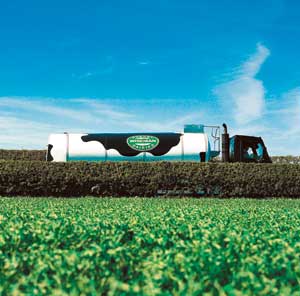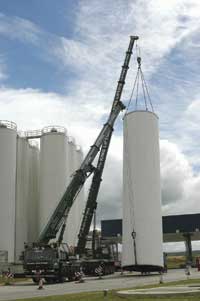‘Milk industry well-placed after 15 years of deregulation’

Milk prices have fallen for most of the past year, dairy farmers have continued to leave the industry at an alarming rate, the UK consistently falls short of quota and one of the major co-ops has collapsed. It’s not a pretty picture.
But director general of Dairy UK, Jim Begg, is adamant that today’s problems are a short-term blip and that getting rid of the MMBs in 1994 was the best thing that could have happened to the UK dairy sector.
He is also clear that there was never any choice.
“There were numerous pressures mounting up that made the MMBs unsustainable,” he says. “For example, the EU had mounted a number of legal challenges against the end use pricing system that operated at the time.”
The existence of state-owned marketing boards also sat uncomfortably with the then Conservative government’s free market philosophy, with agriculture minister John Gummer pushing for change.
“But what tipped it was the group of producer processors, who used a loophole to withhold milk from the MMB and so undermined the whole system,” Mr Begg recalls.
The pressure bearing down on the MMB was so great that it had no option but to consider proposals that would bring about its eventual demise.
“The government wanted the MMB to create a smaller co-op, which would be able to retain processing capacity and stand on its own two feet in Europe,” says Mr Begg.
But in the end they went for Milk Marque – a large single co-op, which had to hive off Dairy Crest, its profitable processing arm, as well as National Milk Records and Genus.
Mr Begg says that was a major mistake. As a near monopoly supplier of milk, it had huge power in the marketplace, inviting processors to bid for volumes of milk at predetermined prices. With no independent arbitrator, farmgate prices rocketed, topping 25p/litre in 1996, threatening the viability of processors.
 It was only a matter of time before the whole system came under attack on competition grounds. “Processors challenged Milk Marque on 10 allegations of distorting competition,” recalls Mr Begg. “They were found guilty of nine of them.”
It was only a matter of time before the whole system came under attack on competition grounds. “Processors challenged Milk Marque on 10 allegations of distorting competition,” recalls Mr Begg. “They were found guilty of nine of them.”
The upshot was that, in 2000, Milk Marque was split up into three regional co-ops – Zenith, Axis and Milk Link – since when the dairy sector has continued to develop apace.
The three regional co-ops engaged in mergers with other co-ops to increase their scale, and embarked on a series of acquisitions to develop processing capacity (see timeline below). The major dairies have also expanded and rationalised, to boost efficiency.
Mr Begg is convinced it has been change for the good. “The old milk marketing scheme gave producers and processors a guaranteed margin. They never had to think about things like efficiency, customer service or product development. While the rest of the world was investing for the future, we were just churning out milk, without regard to whether or not a real market existed.”
Things are very different now. “The whole milk market is far more transparent and we have  supply chains where people actually talk to each other. There is a greater emphasis on efficiency – both among farmers and processors.
supply chains where people actually talk to each other. There is a greater emphasis on efficiency – both among farmers and processors.
“Processors also place much more emphasis on added value and on promoting their products. We have seen the development of fully integrated processing businesses, as well as dedicated supply chains. And farmers are learning how to get the most out of their contracts.”
Mr Begg says he is acutely aware of the current challenges facing the dairy sector stemming from last year’s collapse in global demand. “But the UK is better placed than most, with the exit rate among farmers the lowest in Europe and prices at least matching the EU average.”
And as the world economy emerges from recession and demand for dairy products increases, the UK is well-placed to take advantage. “Had the MMB had not been abandoned, we wouldn’t have a dairy industry now,” he says. “Instead, we are standing on the springboard to prosperity.”
For NFU dairy chairman Gwyn Jones’s view on deregulation, click here
Test your knowledge of the MMB in our special quiz:
Milk marketing timeline 1933: Milk Marketing Board for England and Wales, and Scottish MMB established 1934: Aberdeen and District MMB, and North of Scotland MMB established 1955: MMB for Northern Ireland established 1992: “Towards a New World” proposals published by MMB 1994 (November): Milk Marketing Schemes revoked * Milk Marque established in England and Wales (Andrew Dare as chief executive), with Dairy Crest and Genus hived off * Dairies such as Express, Unigate, Northern Foods, Nestle, Robert Wiseman Dairies and MD Foods start signing up direct suppliers * The Milk Group and United Milk Producers emerge as milk brokerages * Scottish Milk established out of Scottish MMB, with creameries hived off 1995: United Dairy Farmers established in Northern Ireland, retaining creameries and dairies 1996: Northern Foods request Monopolies and Mergers Commission investigation into Milk Marque 1997: Milk Marque acquires Aeron Valley Cheese, then North Bradon Farm1998 Milk Marque selling system, (under which buyers bid for a volume of milk on different “service contracts” at pre-determined prices), investigated by MMC 1999: Competition Commission (formerly MMC) says Milk Marque “exploits its monopoly position” * United Milk formed from parts of UMP, and later invests £45m in Westbury Dairy 2000: Milk Marque split into three regional co-ops – Axis, Milk Link and Zenith 2001: Scottish Milk and Axis merge to form First Milk * First Milk acquires Aeron Valley from Milk Marque 2002: The Milk Group and Zenith merge to form Dairy Farmers of Britain 2003: United Milk into receivership. First Milk, Milk Link and Dairy Farmers of Britain take over Westbury 2004: First Milk acquires stake in Robert Wiseman Dairies * Milk Link acquires The Cheese Company from Glanbia * Dairy Farmers of Britain acquires Associated Co-op Creameries 2008 First Milk and Milk Link merger talks collapse 2009 Dairy Farmers of Britain goes into receivership |
